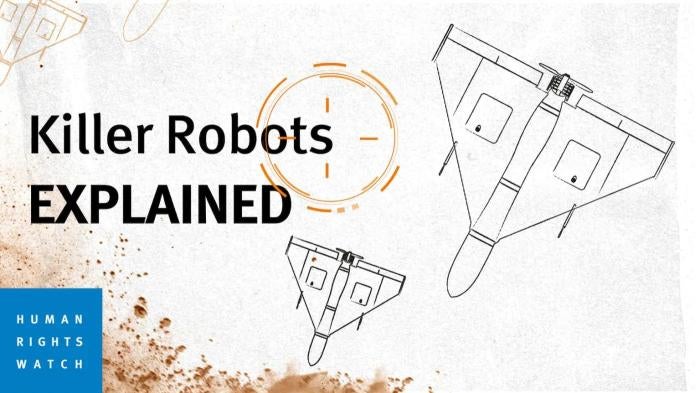Global momentum to prohibit and regulate "killer robots" seems to be building, as evidenced by numerous countries' participation in the first United Nations General Assembly meeting on autonomous weapons systems, Human Rights Watch said today.
Officials from 96 countries, along with representatives from UN agencies, the International Committee of the Red Cross (ICRC), and nongovernmental organizations, attended the General Assembly meeting in New York on May 12-13, 2025.
"Dozens of states expressed grave concerns and alarm about removing human control from weapons systems," said Mary Wareham, deputy crisis, conflict and arms director at Human Rights Watch. "Amid increasing desire for regulating autonomous weapons systems, states should commit to open negotiations on a 'killer robots' treaty this year."

Technological advances and military investments are spurring the rapid development of autonomous weapons systems, which would operate without human intervention. Once activated, these weapons systems rely on software, often using algorithms, input from sensors like cameras, radar signatures, heat shapes, and other data to identify a target. After finding a target, they would fire or release their payload without the need for approval or review by a human operator. That means a machine, rather than a human, would determine where, when, and against what force is applied.
The UN meeting saw many states call for a new international treaty to address these and other concerns, with most advocating for a strict prohibition on autonomous weapons systems that are unpredictable.
At the opening of the UN meeting, UN Secretary-General António Guterres and ICRC President Mirjana Spoljaric Egger reiterated their call for the conclusion of a legally binding instrument banning these "politically unacceptable, morally repugnant" weapons by 2026. The secretary-general has also emphasized this call in his forthcoming 2025 report on the protection of civilians, which will be presented to the UN Security Council on May 22.
More than 120 countries support calls to negotiate a treaty that prohibits and regulates autonomous weapons systems. The ICRC, civil society groups, and many governments say the treaty should prohibit autonomous weapons systems that operate without meaningful human control or that target people. Regulations should ensure that all autonomous weapons systems not covered by the prohibitions operate only with meaningful human control.
Last week's UN meeting considered the serious ethical, legal, humanitarian, security, and technological challenges and concerns raised by allowing machines to take human life on the battlefield as well as in policing and other circumstances.
The UN meeting was mandated by a General Assembly resolution on lethal autonomous weapons systems adopted on December 2, 2024, by a vote of 166 in favor, 3 opposed (Belarus, North Korea, and Russia), and 15 abstentions.
Countries have discussed lethal autonomous weapons systems at Convention on Conventional Weapons (CCW) meetings in Geneva since 2014, but with no substantive outcome. Progress has been hindered by the framework convention's reliance on consensus decision-making, an approach that means a single country can block or reject a proposal that every other country agrees to. A handful of major military powers investing in autonomous weapons systems-most notably India, Israel, Russia, and the United States-have exploited this process to repeatedly block proposals to negotiate a legally binding instrument.
The UN General Assembly, however, provides a more inclusive forum that allows more thorough consideration of the human rights, ethical, security, and other concerns raised by autonomous weapons systems compared to the CCW, which has focused narrowly on military, legal, and technological aspects under international humanitarian law.
"It is essential that all UN member states, regardless of size or technological capability, participate fully in shaping the rules governing these emerging technologies. The risks are global and so must be the response," said Sierra Leone's foreign minister, Musa Timothy Kabba, at the May General Assembly meeting. At least two dozen states that have not joined the CCW attended the meeting.
Human Rights Watch and Harvard Law School's International Human Rights Clinic distributed a new in-depth report at the meeting entitled "A Hazard to Human Rights." The report elaborates how autonomous weapons systems contravene fundamental human rights during both peacetime and armed conflict, including the rights to life, peaceful assembly, privacy, and remedy, as well as the principles of dignity and nondiscrimination.
During the UN meeting, several states highlighted human rights implications of autonomous weapons systems. Algeria said that such systems "fundamentally challenge the right to life by removing human judgement from lethal force decisions." El Salvador and Ireland similarly expressed deep concern about the incompatibility of autonomous weapons systems with the right to life.
Austria, Costa Rica, El Salvador, Guatemala, and other countries raised concerns about the accountability gap created by autonomous weapons systems, as it is unclear who could be held legally responsible if such systems violate international humanitarian law or human rights law. There are obstacles to holding individual operators criminally liable for the unpredictable actions of a machine they cannot understand. Additionally, there are significant legal challenges to finding programmers and developers responsible under civil law.
Human Rights Watch is a co-founder of the Stop Killer Robots campaign, a coalition of more than 270 nongovernmental organizations in 70 countries that calls for a new international treaty to prohibit and regulate autonomous weapons systems. The campaign supports the development of legal and other norms that ensure meaningful human control over the use of force, counter digital dehumanization, and reduce automated harm.
"Autonomous weapons systems will invariably violate international humanitarian law and human rights law and raise a multitude of ethical concerns," Wareham said. "Countries need to go beyond simply stating their concerns and begin immediate treaty negotiations to protect humanity from these dangers."






